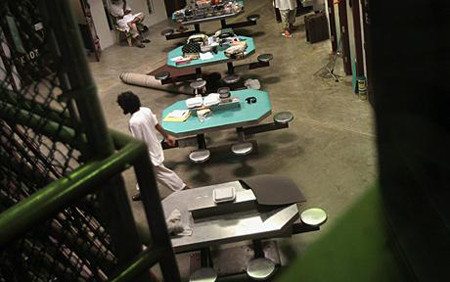By Duncan Gardham
Papers released to lawyers for six former terrorism suspects detained at Guantanamo Bay show that the former Prime Minister was “initially sceptical about claims of torture” but had changed his mind and wanted reassurances from the Americans.

Detainees walk through a living area at the U.S. detention center for 'enemy combatants' in Guantanamo Bay, Cuba (Photo: GETTY)
The detainees, who include Binyam Mohamed, are suing MI5, MI6, the Attorney General, the Home Office and the Foreign Office for alleged complicity in their mistreatment.
They are seeking the release of thousands of documents and yesterday complained to the High Court that the release was too slow and many documents already released have been heavily redacted.
They were also seeking to find out if Mr Blair and his advisers have been consulted by the government “to see if they can assist in identifying documents.”
One letter, sent to Mr Blair and dated January 18 2002, said that a team from MI5 and the British Embassy in Washington had arrived at the Guantanamo Bay US military base in Cuba where the detainees were held and “will be interviewing the detainees in accordance with the agreement reached with the Americans.”
It added: “Their dual aim is to obtain information on any terrorist activities affecting the UK and to establish the identity of any British nationals.”
One paragraph had been redacted but the letter concluded: “This will continue to be a difficult issue to handle, both in procedural and legal terms with the US and in handling parliament and the media here.”
What appear to be Mr Blair’s handwritten comments were at the bottom of the letter and read: “The key is to find out how they are being treated.
“Though I was initially sceptical about claims of torture, we must make it clear to the US that any such action would be totally unacceptable and very quickly establish that it isn’t happening.”
The memo followed an email sent from a British liaison officer on January 13 and circulated to Geoff Hoon, then the Secretary of State for Defence, that was heavily redacted but appears to warn of mistreatment as prisoners arrived at the American-run Bagram prison in Afghanistan.
It was headed: “Defensive lines maybe necessary and the FCO [Foreign and Commonwealth Office] may be interested” and further down: “I thought you might be interested in the comments of our SBLA [Senior British Liaison] I think they may be a little too controversial for the Opsum [Operation summary].”
In handwriting at the bottom was added: “graphic descriptions.”
The memo read: “From my visit to Bagram 10/11 January and watching the reception of the 80 plus prisoners, it would seem that this detainee issue is one that has the potential to reflect on the US/Coalition…the US treatment of the prisoners could be judged to be [redacted]. On the night of the reception [redacted].
“The ICRC [International Committee of the Red Cross] were allowed to look in but were denied access. It is clear that the US is pushed logistically but my understanding of the Geneva Convention is that this is no excuse.”
The issue of how to treat detainees was considered by the British Embassy in Washington as early as October 24 2001, seeks weeks after the 9/11 attacks, according to another memo.
Another memo dated wrongly but thought to be around January 10 2002, said: “US plans to start transfers today” and added: “Transfer of UK nationals held by US forces to Afghanistan to the US base in Guantanamo is the best way to meet our counter-terrorism objective by ensuring that they are securely held and can be questioned about their activities.”
But it added: “We have some concerns about the way the US might handle detainees both in terms of [redacted] and prosecution.”
It said the only alternative was for Britain to take custody of the detainees in Afghanistan, where they did not have the facilities, or to repatriate them and promise the Americans they would be prosecuted.
A section has been blanked out, leaving the comment: “We could not therefore give such a guarantee within the deadline set by the Americans.”
Four days later a memo sent to Sir David Manning, Tony Blair’s foreign policy adviser, said MI5 and MI6 had a “team in theatre” and that police and the Crown Prosecution Service were examining whether there “appear to be the basis for successful prosecutions.”
It added: “We have raised no objections in principle to the transfer of UK nationals [from Afghanistan to Guantanamo Bay].”
The other former detainees are Bisher al-Rawi, Jamil el-Banna, Richard Belmar, Omar Deghayes and Martin Mubanga.
The appellants are trying to find out when officials first became aware of rendition and mistreatment and Mr Justice Silber said: “This is one of the most important parts of the case.”
The case continues.



